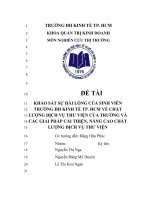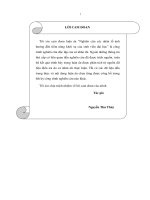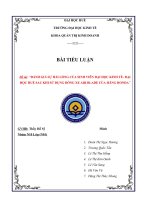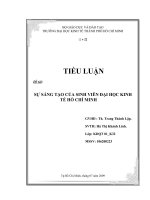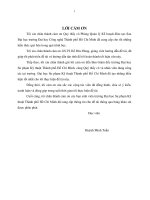THE USES OF FACEBOOK AMONG UNIERSITY STUDENTS_VIỆC SỬ DỤNG FACEBOOK CỦA SINH VIÊN ĐẠI HỌC
Bạn đang xem bản rút gọn của tài liệu. Xem và tải ngay bản đầy đủ của tài liệu tại đây (203.48 KB, 19 trang )
THE USES OF FACEBOOK AMONG
STUDENTS AT UNIVERSITY
ABSTRACT
Facebook undoubtedly is one of the most popular social networks in the world today. It
has a great deal of influences towards the modern society, leading some significant
changes to people’s lives in recent years.Students are no exception. Facebook has offered
a number of activities and features that students can do and make use of such as
exchanging information, chatting with friends, etc. Thus, it has caused some effects, both
positive and negative, to students. Based on data collected from survey carried out within
Hanoi University, our team’s aim is to investigate the uses of Facebook among
University students as well as its impacts. Besides, some recommendations concerned
this issue are also mentioned. We believe that this report can serve as an useful
information about circumstances of Facebook’s usage among students.
TABLE OF CONTENTS
ABSTRACT………………………………………………………………………………i
LIST OF FIGURES.……………………………………………………………………...iii
1. Introduction…………………………………………………………………………….1
2. Method…………………………………………………………………………………2
3. Results………………………………………………………………………………….2
4. Discussions of findings…………………………………………………………………4
4.1. The use of Facebook among students………………………………………………...4
4.2. Impacts of Facebook on students……………………………………………………..5
4.2.1. Positive effects……………………………………………………………………...6
4.2.2. Negative effects…………………………………………………………………….6
5. Recommendation……………………………………………………………………….6
6. Conclusion……………………………………………………………………………...7
REFERENCES……………………………………………………………………………8
APPENDICES…………………………………………………………………………….9
LIST OF FIGURES
Figure 1: Students’ time spent on Facebook per day……………………………………..2
Figure 2: Students’ activities on Facebook………………………………….....................3
Figure 3: The positive effects of Facebook……………………………………………….4
Figure 4: The negative effects of Facebook………………………………........................4
1. Introduction
Facebook is one of the greatest social media in recent times, which involved millions of
young people including teenager and adolescent using this popular application. As you,
one of the miliions users, already know the attractiveness of facebook coming along with
its hundreds of incredible cool effects and this awesome app also brings lots of utilities.
For instance, you can chat with a friend far 1000 kilometres away from you with a
connection to internet or maintain your social status by making online friends, joining a
groups of people with same habbits and hobbies. These convenient and alluring features
are the reason why millions of people using this application regularly and take it as a part
of their daily life.
Similarly, the students are not an exception. Our research will focus mostly on the
frequency of the times students spend on facebook and the impact of this trending app on
those studying at the department. In the last decade, the use of social networking sites has
grown exponentially. For example, statistics provided by Newsroom (2019) reveal that as
of March 2014 there were 2.38 billion active users on the site per month, and at least 1.56
billion of these users logged into Facebook every day. With statistics such as these, it is
not surprising that Facebook is the most popular social networking site in the world. It is
also one of the most popular websites on the Internet, third placement on the chart of
global usage (Alexa Internet, 2019). As a result of this popularity, social scientists have
recently begun to examine aspects of its use (Wilson, Gosling & Graham, 2012).
Facebook was originally created by Zuckerberg to help students identify other students.
Since its creation, its usage has gained momentum particularly among students (Roblyer,
McDaniel, etc, 2010, cited in Moghavvemi, 2015). Students used them not only for
communication, learning activities but also to socialize.
Socialization is part and parcel of the young adult in their daily life. In today’s world, one
of the easiest and fastest ways to socialise is using the Facebook. Facebook usage has
been receiving numerous attentions. Some say it brings positive impacts on students’
performance, some say no impact while others say there are negative impacts. All of
these above researchs have clearly shown how popular facebook is and what the effects
are on students, which is mostly demonstrated on our research. However, this paper will
focus more on the facebook usage intensity and both the positive and negative impact of
facebook, and answer three main questions. Firstly, how often does a student use
facebook?
Secondly, which one do the students suffer from the most, positive or negative effect?
And finally, is facebook needed for a better academic performance?
2. Method
The data used in this report is acquired from a survey carried out within Hanoi
University. In the first place, 100 students from English Department were randomly
selected in order to fill in the questionaires. A total of 10 questions were catagorized into
2 main groups. The first half of quesionaire were designed to analyze the use of social
network Facebook among students. The other questions were organized to get a detailed
information about the positive and negative effects of Facebook to students. These
questions also helped to evaluate students’s awareness about such affects. The main
purpose of this survey is to have a further investigation into students’s use of Facebook as
well as the impacts of it to students, especially their academic life.
3. Results
This survey was conducted through the cooperation of 50 students. Thanks to this, the
acquired results have clearly shown the uses of Facebook among students. According to
the figures from questionaire, all of 50 students in this survey answered that they
currently have a Facebook account.
Figure 1: Students’ time spent on Facebook per day
As can be seen from Figure 1, a huge number of students (58%) spent from 1 to 5 hours
using Facebook while a small proportion of students only took more than 10 hours to
access it. In addtion, 24 % reported that they use Facebook less than 1 hour, which is as
twice as the number of students spending from 5 to 10 hours on this social network.
Figure 2: Students’ activities on Facebook
Turning activities on Facebook, the main things students usually do were entertainment
and communication (74% and 76% respectively). The next place are news &
information (58%), education (38%) and networking (34%). Business, however, was the
activity that the proportion of students taking part in was quite low (20%). With regard to
student’ interest, a large number of students (84%) chose Messenger as a feature of
Facebook that they like while, other than common features like News Feed (48%), photos
(34%) and timeline (10%), there were a few students (4%) having an interest in video and
story.
Figure 3: The positive effects of Facebook
As can be seen in the chart, communication leads the trend with 39 out of 50 (78 %)
votes, following up close is 36 votes (72%) from entertainment purpose. Taking the third
place with 29 votes counted (58%) is people’s intention of using Facebook for finding
information, which nearly double the figure of education. Similarly, the proportion of
business (18%) is halved the number of emotion (2%), as the former took the 4th
placement on the list.
Figure 4: The negative effects of Facebook
Addiction is the most common negative impact that affects students using Facebook as its
number rivals to the top (26 votes, 52%). Altogether, insecurity and privacy invasion
share the same number of 23 votes (46%) as well as the figure of cyberbullying and
relationship damaging. Finally, there are few who has not had any bad effects when using
this application.
When it comes to questions about effects, there are nearly half of them (44%) answer that
Facebook makes their academic performance better while 38% say the opposite. The
others still do not have any idea about this.
4. Discussions of findings
4.1. The use of Facebook among students
From the resullts presented above, it is not a surprise that all of 50 students quesioned
says that they own a Facebook account. Although the figures are just taken from a limited
number of students and cannot cover all students, it is no doubt that Facebook is one of
the most popular social networks in the perspectives of many students. This is
understandable as Facebook has always triumphed over all other social networks with
over 500 million active users every month (Bedassa, 2014). It draws the attention from a
wide range of all kinds of people, especially university students. Thus, it is very
reasonable if there are a large number of students using Facebook.
From the results as shown in Figure 1, it can be easily seen that most student spend a
huge amount of time on Facebook. This result is totally within expectation when it comes
to current trends. This generation has grown up along withs the rise of a specific social
network called Facebook. Although Facebook is not the only social platform at that time,
it has satisfied most users’ hearts thanks to the build of many utilities. To our expectation,
these utilities has somewhat fitted with the acquired results of students’ activities and
features they like on Facebook.
The common reason for Facebook’s popular use is its ability to keep in touch with each
other. In the globalization age, communication between people becomes more than
necessary. Facebook can provide the users easy and convenient way of communication
with a variety of features attached with like emoticons, file-sharing, etc. It gives people
power of communication in their palms of hands as they just pick up some devices and
then go to Facebook application or website without having to meet face-to-face
(Boukouvidis, 2015). Another reasons for this are due to social capital and social
grooming needs (Wilson, Gosling&Graham, 2012). In other words, it is a basic desire to
maintain social relationships even if it is just in virtual network such as Facebook
(Wilson, Gosling & Graham, 2012).
In terms of information, entertainment and networking, Facebook certainly has achieved
these. Whatever it is global, national or local issues, it contains a vast information in
many fields while it can provide users with some type of entertainments like memes,
games and some other applications (Boukouvidis, 2015). Facebook is the site where
students can both find free information and communicate with other people so it helps
education more easier. The information-sharing in many forms like documents , photos,
pictures has enhanced students’s interaction and information exchange via Facebook.
Turning to business issues, although Facebook contains a large amount of information
about it, university students can only take part-time jobs at most so it is understandable
for the reasons this activity is quite low.
4.2. Impacts of Facebook on students
4.2.1. Positive effects
Why do so many youngsters use all of their hours checking Facebook and what are the
good benefits that this application provide? There are many reasons behind the scene, but
it all start with Facebook’s features. What make Facebook so popular mostly because of
its attractive functions such as newfeed, messenger, posting, comment section and many
services which meets the requirements of the user. So, what benefits do users (we will
focus mainly on students) gain from using Facebook? Looking at the Figure 3, we can see
that most of the student avail Facebook for communication purpose. It is a great way to
keep in touch with your family and friends that live far away. With instant messaging and
even video chat, Facebook is the perfect place to stay connected. With the status updates,
photos, and profile information, it can keep you up to date on the happenings of all of
your close ones. Facebook is also a great place for entertainment, as many students said
they were using it for watching memes, funny videos or maybe for laughing at
somebody’s love got rejection. Generally, using Facebook could help you reduce stress,
anxiety and other psychological diseases if you put it in a good use.
4.2.2. Negative effects
Facebook is great for communication, networking and planning events. It is a social
media platform that was designed to connect people and clearly it achieves this in a
number of ways. However, as we have listed out on the result we found, the negative
impacts are more and worse than the opposite one. First on the list is addiction. There is a
symptom called Facebook Addiction Disorders (FAD), and many students in our
department has fallen upon its sleeve, as they get addicted unconsciously. A large number
of interviewers affirmed that they got hooked up to Facebook and, consequently, affected
their academic performance. Privacy is a great concern when Facebook has become the
most popular social networking site among young users, and many people are relying on
this app for many purposes, which is easier for intruder to crawl over your “wall” to get
information about your personal life.
What’s more, cyberbullying is a common issue which appears within students because
they can use the popularity and how fast and spread-out news can travel from one person
to others to blackmail for their own profit. If students allow these bad effects to involve
into their daily lives, Facebook is dangerous and unneeded in improving academic
performance.
5. Recommendation
There are many ways to deal with negative impacts, but the most important way is to
change your behavior. You could reduce the time you checked your status, messaged to
your friend, spent hours of your free time on newfeed, however, reality is often
disappointing. Many people have tried to stay away from Facebook for a long time, yet,
after a short while, they started returning to use it again. The lacking ingredients in this
recipe are people short of determination and courage. They have ideas, plans which is
detailed from A to Z, and they even swear for success, and after a couple of months, you
see them failed miserably.
Learning from this, students should set their goals and sensible timetables to achieve
those targets. They should also must be determined on what they need to do, focusing
more and must not lose your will to achieve greatness. According to Health and Wellness
Services (2019), they should set their limitation time from twenty to thirty minutes away
from Facebook and turn on “do not disturb” feature. By doing this, students will have
more time to achieve better academic performance and enjoy many things outside of the
digital screen.
6. Conclusion
In conclusion, we have seen that many students still did not have a slightest idea about
how they use Facebook and what the effects are when using it, which this paper would
make them understand more about it and help them handle the problems more effectively.
We have mainly discussed on the frequency of hours students spend their time on
Facebook and the activities which mostly use by undergraduate when they visit the site.
Moreover, we have found many impacts, both good and bad, on academic performance
and made some suggestions for negative ones. We hope that this research will be seen as
motivation, ninspiration for many studies, in order to thoroughly open up all the potential
possibilities that we have missed out due to the short amount of time of our investigation.
REFERENCES
Alexa
Internet,
Inc.
(2019). Top 500 sites
on
the web. Retrieved from
/>Bedassa, F. (2014). Impact of Facebook Usage on Students Academic Performance.
Retrieved
from
/>Boukouvidis, T. (2015). Four Reasons Facebook Is So Popular. Retrieved from
/>Health and Wellness Services. (2019). Healthy Buffs: How to stop the social media
spiral. Retrieved from />Moghavvemi, S. (2015). Facebook usage, socialization and academic performance.
Retrieved
from
/>ic_performance
Newsroom. (2019). Stats. Retrieved from />Wilson, R.E., Gosling, S.D., & Graham, L. (2012). A Review of Facebook Research
in
the
Social
Sciences.
Retrieved
from
/>esearch_in_the_Social_Sciences
APPENDICES
APPENDIX A
QUESTIONAIRE
We are doing a research about the uses of Facebook among university students. The
information well have collected from this survey is used for a single purpose of doing
research. Hope everyone helps us answer the whole question so that we can complete this
study well. Thank you so much for your help!
1. Do you currently use Facebook?
o Yes
o No
If your answer is “Yes”, please go to question 3. If your answer is “No”, please go to
question 2.
2. Why do you not use Facebook?
o Do not know Facebook
o Do not find it necessary
o Use another social network
o Others (Please specify)
______________________________________________________
3. How many hours do you use Facebook per day?
o <1 hour
o 1-5 hours
o 5-10 hours
o 10+ hours
4. What do you use Facebook for? (You can choose more than one answer)
o Networking
o Communication
o Education
o Entertainment
o Business
o News & Information
o Others (Please specify)
______________________________________________________
5. What features of Facebook do you like? (You can choose more than one answer)
o News Feed
o Messenger
o Photos
o Timeline
o Others (Please specify)
_____________________________________________________
6. Which benefits do you get from using Facebook? (You can choose more than one
answer)
o Communication
o Business
o Information
o Entertainment
o Education
o Others (Please specify)
______________________________________________________
7. What negative effects do you get from using Facebook? (You can choose more than
one answer)
o Cyber-bulling
o Relationship damage
o Insecurity
o Addiction
o Privacy
o Others (Please specify)
______________________________________________________
8. How do Facebook affect to your academic performance?
o Good
o Bad
o I don’t know
9. How would you evaluate the effectiveness of using Facebook?
o Very good
o Good
o Average
o Bad
o Very Bad
10. As a student, can you give me your own thoughts about the impact of
Facebook on your school life?
________________________________________________________________________
________________________________________________________________________
________________________________________________________________________
___________________
THANK YOU FOR YOUR COOPERATION!
APPENDIX B
INTERVIEW QUESTIONS
1. Do you often use Facebook?
2. What activities do you do in Facebook?
3. What benefits and drawbacks do you get from Facebook?
4. In your opinion is Facebook good or bad?
5. As a student could you give some opinion about the impacts of Facebook
on your academic performance?


